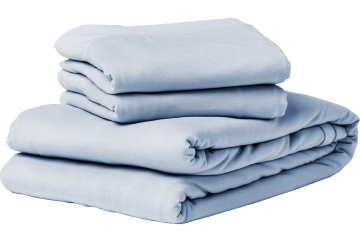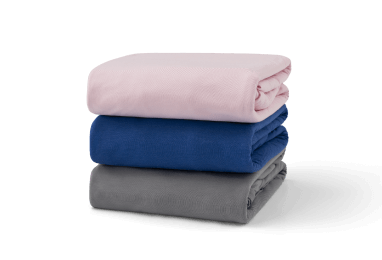Your Guide To Getting The Softest Bed Sheets
Your choice of bed sheets can turn your bed into either your favorite place on earth or a scratchy, crinkly, and hot minefield that makes it nearly impossible to relax.
When it comes to choosing the softest sheets for your bed, we have you (literally) covered. We’ll break down everything you need to know about creating an oasis of comfort with your bedding.
What Makes Sheets Soft?
Thread count. Weave. Material choices. Colors. Sizes. When it comes to picking out the softest bed sheets and pillowcases, there’s a lot to consider. While some people might think their choice of bedding is pretty simple, there’s actually a lot to keep in mind and an almost unlimited number of choices.
Be familiar with the different types of bed sheets.
Thread Count And Ply
Thread count represents the number of horizontal and vertical threads per square inch of fabric. Many people believe that the higher the thread count, the higher the quality of the sheets. But this isn’t always true.
According to Consumer Reports, the sweet spot for a soft but affordable thread count is somewhere between 200 to 400. Anything higher and you can expect to spend more than average.
Ply simply describes how many threads are wrapped together. A fabric labeled as single-ply has just one thread, while sheets you see labeled as double-ply use two threads twisted together.
Weave
The way the threads of a particular fabric are oriented to one another is its weave. Bed sheets come in a variety of weaves, including:
- Twill: Twill sheets are sturdy and long-lasting. However, they come in a ribbed pattern which may not be comfortable for some people.
- Jersey sheets: This stretchy weave results in more breathable sheets. It's affordable, too, but don't expect it to be as durable as twill or percale.
- Sateen: Sateen sheets give you a smooth and silky feel. They're also quite cozy for cold weather, as they have a warmer feel to them.
- Percale: The percale weave is often considered the strongest weave. Percale fabric is breathable, smooth, and has a crisp feel to it. It doesn't retain body heat like sateen, either.
- Flannel: Cozy flannel sheets are your best bet for winter. Flannel fabrics are fuzzy, warm, and relatively inexpensive. But, like jersey, they don't last as long as other types of sheets.
Processing
Generally, the less processed a sheet is, the softer it will be. This includes color processing, as well. Usually, your best bet for the softest sheets is to choose a material that hasn’t gone through a dyeing process. This can make it difficult for people who want to match their sheets to their décor, but you should test some non-dyed sheets to see how they feel before making a decision.
Fibers
Sheets are made from a variety of different materials. In general, higher-quality fabrics yield higher quality and softer bed sheets.
Every type of fabric has different qualities that cater to the preferences of different sleepers. What seems super soft and cozy to you might seem heavy or uncomfortable to someone else.
Some fabrics are also cooler to the touch than others. Hot sleepers should consider this factor when picking bed sheets.
How To Choose The Material For The Softest Bed Sheets
If you’ve done your research on bed sheets, you’re probably well aware of the fact that sheets are available in a wide array of materials, from cotton to silk. You can find sheets made out of natural fiber and synthetic fiber as well as blends. You have options if you want sheets that are organic, sustainable, and hypoallergenic, too.
So, how do you choose? The truth is that there is no one “right” fabric. Like so many things associated with getting your best sleep, your bed sheet material is 100 percent personal preference.
That being said, each type of fabric has its own unique properties.
Cotton Sheets
Cotton has long been a popular bed sheet choice. As you wash it, cotton will usually become softer over time.
When shopping for bed sheets, you’ll find that there are many types of cotton. Remember not to focus too much on thread count – look at the quality of the cotton used instead.
- Egyptian cotton is considered a premier type of cotton because it’s highly absorbent and breathable. But finding true Egyptian cotton can be hard, and you can’t always be sure about the reliability of its sources.
- Pima cotton is known to be long-lasting and durable.
- Organic cotton, which is grown without herbicides, pesticides or fertilizers, is a nice option to pair with your hypoallergenic mattress if you have sensitive skin or prioritize environmentally-friendly products.
- Supima cotton is a staple cotton with long, smooth, soft weaves. Turkish cotton, in particular, has a luxuriously soft feel.
Linen Sheets
Linen is a natural fiber and one of the oldest fabrics in the world. Its fiber is strong and durable, and over time it breaks into a cool, luxurious feel.
Linen has long been considered a more decadent alternative to cotton sheets. Lower quality linen might feel a bit stiff and scratchy to some users, but high-quality linen should feel crisp and textured but not rough. Linen is also highly breathable, so linen sheets are great for summer.
Linen bed sheets can be a bit pricey, so just know that if you’re going for the more luxurious, higher-quality linen, you’ll need to budget accordingly.
Bamboo Sheets
Bamboo fabric is exceptionally eco-friendly and, in our opinion, the softest and most comfortable bed sheets you can find.
To produce them, the bamboo fibers are mashed into a soft pulp and then dried into threads. These threads are then woven into luxurious fabric that can be made into soft, silky bed sheets that wrap you up in comfort.
Tencel Sheets
Tencel is a brand name for a type of rayon called lyocell. This eco-friendly, semi-synthetic material is made from eucalyptus trees and provides a silky soft feel and lustrous sheen.
As it is made from eucalyptus wood pulp, Tencel is a soft fabric that's cool to the touch. It has moisture-wicking properties that helps keep hot sleepers from sweating too much. Tencel is also highly durable and wrinkle-resistant, making it great for those who toss and turn at night.
Microfiber Sheets
Microfiber is typically made from synthetic fabrics like polyester and nylon. They are finely woven and double brushed, which gives them a warm, smooth, and soft finish. Microfiber threads are ultra-thin. In fact, they’re thinner than a single strand of silk, although also durable and extremely strong.
Silk Sheets
Silk sheets are soft, but they aren’t for everyone. Silk is a natural fiber with a soft, shiny, and decadent finish. And we’re talking real silk — not those imitation silk sheets made from polyester that often see on store shelves. Knockoffs are slippery, but genuine silk sheets give you lots of softness and no sliding around the bed while you’re trying to sleep.
There are several different types of silk. Most notable, perhaps, is Mulberry silk, which is produced by silkworms that have eaten nothing their whole lives except for mulberry leaves.
Which Bed Sheets Are Right For Me?
Your bed sheets play a vital role in getting a good night’s sleep, yet their importance often goes overlooked – except to make sure they look good and match our overall bedroom decor. But if you sleep on stiff, itchy sheets, you can almost certainly count on having a poor night’s sleep.
What makes a comfortable sheet depends on a variety of factors, from thread count, ply, and weave to fabric material, processing, and even the level of maintenance you put into them. Still, at the end of the day, there is no such thing as the ideal sheet. The coziest sheets are the ones that match your needs.
Purple SoftStretch Sheets
Luxuriously soft and cool. Four way stretch to optimize comfort and support.
Purple Kid Sheets
Twin size sheets that are soft, stretchy, and breathable for all-night comfort. Bed time awaits!
Frequently Asked Questions For The Softest Bed Sheets
What is the best thread count for sheets?
A high thread count doesn't necessarily mean a comfortable and durable sheet. Look for sheets with a 200 to 400 thread count.
What are the softest sheets for hot sleepers?
For sweaty sleepers, the best options are linen, bamboo, and Tencel. In terms of weave, a percale sheet is better than a sateen weave.
Should I get bamboo or cotton bed sheets?
It’s hard to find any other fabric on the market that can rival bamboo in softness. Even a lower-thread-count bamboo sheet can feel considerably softer than a luxury, high-thread-count cotton sheet.


